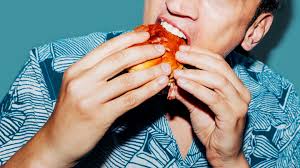Most people have felt an intense craving for a certain food at some point—but when does that craving become something deeper?

Fast foods and highly processed items often contain ingredients that keep people coming back for more. But does this mean they’re truly addictive?
The answer isn’t simple. Some professionals argue that “addiction” should be reserved for substance use disorders, not food-related issues.
Research into the psychology behind eating behaviors is ongoing, and opinions vary widely, making this a complicated topic.
Still, one thing is clear: if you’re struggling with your relationship to food, support is out there—and you’re not alone.
Here’s what experts currently understand about food addiction, the surrounding debate, and how to seek help if you’re affected.
Understanding the Concept of Food Addiction
Programs like Overeaters Anonymous use a model similar to that of Alcoholics Anonymous, but food addiction is not officially recognized in the Diagnostic and Statistical Manual of Mental Disorders, Fifth Edition (DSM-5), published by the American Psychiatric Association.
Whether or not it fits a formal definition, it’s essential to consider the perspectives of those who feel impacted.
Is It Truly an Addiction?
Dr. Anne Marie O’Melia, chief clinical officer at the Eating Recovery Center, says that for some people, the term “food addiction” feels validating and helpful.
Still, she cautions against overly rigid interpretations of the term, suggesting that it’s more accurate to view food as something that can trigger addiction-like responses in certain individuals.
Licensed therapist Dr. Teralyn Sell, however, believes that if someone consistently overeats, eats in secret, or feels withdrawal-like symptoms, it qualifies as addiction.
Dr. Cali Estes agrees, citing studies showing that the brain’s response to certain foods mimics reactions seen in substance use disorders.
How Is Food Addiction Different from Drug Addiction?
A major criticism of the term “food addiction” is that it might diminish the seriousness of drug dependency.
The U.S. opioid crisis has caused significant loss and trauma. According to CDC data, over 80,000 opioid-related deaths occurred in 2021.
A 2020 study showed only modest overlap between people with food-related compulsions and those who meet criteria for substance use disorders. However, a 2018 review proposed that addictive eating behaviors align more closely with substance abuse models than with behavioral disorders.
Dr. Sell acknowledges that while food addiction may not have the life-threatening consequences of drug addiction, it’s still a serious problem that requires attention and support.
Scientific Findings on Food and Addiction
Though the DSM-5 doesn’t recognize food addiction as a clinical diagnosis, research interest in the topic has grown significantly.
A 2022 study involving 194 college students noted that a strong urge to overconsume highly palatable foods is a key characteristic. The researchers found links between such cravings and poor eating habits, low body image, and poor food choices.
A 2019 review called for greater awareness of food addiction and advocated for policy-level interventions. Similarly, a 2018 systematic review identified traits of food addiction, including:
-
Brain function changes
-
Loss of control
-
Preoccupation with food
-
Chronic relapse patterns
-
Social disruption
-
Continued risky use
That study suggested that the content of highly palatable foods—not just eating behavior—is key to addiction-like responses.
Still, skepticism remains. A 2021 paper argued that the term “food addiction” may oversimplify the issue and fail to help with obesity or eating disorder treatments. Concerns include:
-
Diagnostic confusion with other disorders
-
Mistaking high-calorie needs for addiction
-
The influence of weight loss attempts on behavior
-
Lack of new, effective treatment options
How the Brain Responds to Food
Scientists continue to investigate whether food truly qualifies as an addictive substance by examining how it interacts with brain chemistry.
Dr. O’Melia explains that for some, frequently consuming highly processed, tasty food may change reward-related brain pathways in a way similar to drug dependency.
These foods stimulate the brain’s pleasure centers, releasing chemicals like dopamine and endorphins.
A 2020 review compared dopamine activity in individuals with food addiction to those with tobacco use disorder, while a 2021 study found reward-circuit differences in the brains of people with food addiction symptoms.
Other findings show that ultra-processed foods activate the brain’s reward systems more intensely than whole foods.
Even without subjective enjoyment, eating can cause the brain to release opioids, according to a small 2017 study.
And a 2011 study suggested obese individuals may have impaired dopamine-related functions, impacting reward sensitivity and behavior control.
Though early-stage, these findings may help explain why certain people compulsively eat pizza or cookies—but not broccoli.
How Social Factors Affect Eating Habits
Cultural and socioeconomic factors play a huge role in dietary habits and food access.
A 2020 study of 37 parents from underserved communities found that processed foods were often favored for convenience, even though less processed foods were viewed as healthier.
Another 2021 study reported that people in historically marginalized communities often face longer travel distances to reach stores that sell healthy food.
A 2018 study found Black Americans were more likely to consume hyper-processed foods and experience higher rates of hypertension.
Dr. Sell emphasizes that food deserts and limited access to fresh options make it much harder for people to choose healthy food.
Tackling Compulsive Eating Habits
Whether labeled “addiction” or not, problematic food behaviors can be challenging—and deserve compassionate treatment.
Experts recommend a range of strategies, including:
-
Practicing self-kindness
-
Personalized care that doesn’t fixate on weight or willpower
-
Identifying trigger foods
-
Nutritional guidance
-
Medication, when needed
Dr. Sell warns against using “should” statements, which can lead to guilt and relapse. She advocates for supportive, shame-free approaches to healing.
Dr. O’Melia agrees, noting that care must be customized. Treatment plans should explore:
-
Psychological and social drivers of behavior
-
Cultural attitudes toward food and body image
-
Tools for building emotional resilience and self-worth
Since people can’t abstain from food entirely, she advises working with professionals to manage challenging foods rather than eliminate them altogether.
That includes meal planning, eating at regular intervals, and prioritizing social and emotional support around eating.
A 2020 study found that Tele-CBT (cognitive behavioral therapy conducted remotely) offered short-term improvements for those struggling with food-related issues.
In cases where compulsive eating coexists with bulimia, Prozac may be prescribed. Other medications like bupropion may help manage obesity or related health conditions like diabetes.
Underlying medical or psychological conditions should also be addressed in treatment plans.
Common Questions About Food Addiction
How widespread is food addiction?
A 2021 review of over 196,000 people found that up to 20% may experience food addiction. It was more common in women, people over 35, and those with higher BMIs. Another study linked it with binge eating and reported even higher rates in those pursuing bariatric surgery.
Is food withdrawal real?
Some studies and self-reports suggest that stopping processed food can cause symptoms like anxiety, mood swings, or headaches. However, these effects are usually milder than those seen in drug withdrawal.
Is it really an addiction?
Some experts, like Dr. O’Melia, feel “addiction” may be too strong a word. Others, like Dr. Sell, argue that if it feels like a problem, it should be treated as such—no matter the label.
What makes food addictive?
Research highlights that refined carbs, fats, sugar, and salt—often found in ultra-processed foods—can strongly activate reward pathways in the brain, making them more “addictive” than whole foods.
Dr. Sell notes that processed foods tend to be more potent in stimulating dopamine release than natural foods like fruits or vegetables.
Final Thoughts
Whether or not “food addiction” is the best label, many people struggle with food in ways that feel compulsive or harmful.
Studies suggest that highly processed and sugary foods can influence brain chemistry in ways similar to addictive drugs, though more research is needed.
If you’re facing challenges with eating behaviors, help is available. Compassionate, individualized care that focuses on emotional health—not just weight—is the key to building a healthier relationship with food.

